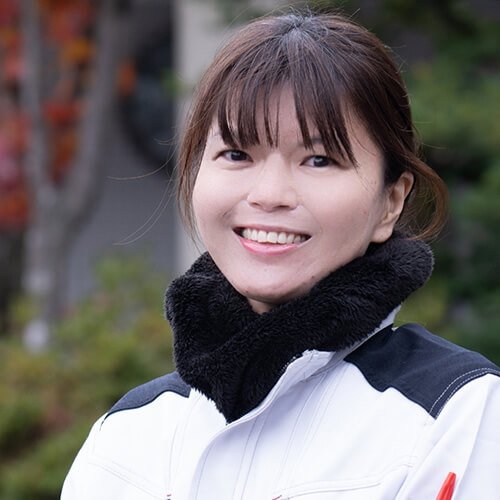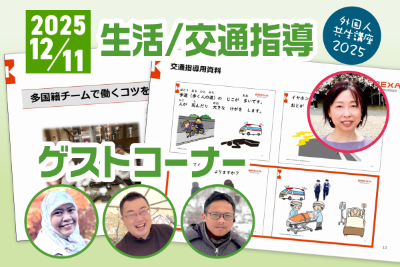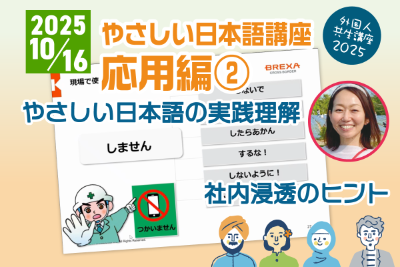- やさしい日本語
- ひらがなをつける
- Language
We provide multilingual content through machine translation. Translation accuracy is not 100%. About the multilingualization of the JAC website
- About JAC
- JAC Membership Information
- Specified Skilled Worker Acceptance
- Specified Skilled Worker Overview of the system
- 10 Mandatory Assistance for Foreigners
- Online individual consultation
- Seminar on Coexistence with Foreign Nationals
- Leading examples of host companies
- Case studies collection "Visionista"
- Foreigner's Voice
- Foreign Resident Acceptance Manual / Q&A
- Useful column "JAC Magazine"
- Acceptance support services
- Specified Skills Acceptance Support Service
- Skills improvement support
- Online Special Education
- Skill training
- Japanese Language Course
- Education and Training Support
- Subsidy system for obtaining qualifications
- Support for creating a comfortable workplace
- Temporary Return Support
- CCUS charge support
- Support system for promoting the accumulation of employment history
- Post-acceptance training
- Compensation system for Specified Skilled Worker (i)
- Daily life support
- Medical interpretation support
- Support for daily life problems
- freeJob matching
- The Specified Skills Evaluation Exam
- Home
- JAC Magazine
- Specified Skilled Worker System Key Points
- What are Specified Skills? A detailed explanation of the process for accepting foreigners and the support organizations
- Home
- JAC Magazine
- Specified Skilled Worker System Key Points
- What are Specified Skills? A detailed explanation of the process for accepting foreigners and the support organizations

What are Specified Skills? A detailed explanation of the process for accepting foreigners and the support organizations
I wrote the article!

(One company) Japan Association for Construction Human Resources
Chief of Research and Development Department / Administration Department / Public Relations Department
Motoko Kano
(Kano Motoko)

Hello, this is Kano from JAC (Japan Association for Construction Human Resources).
Japan as a whole is facing a labor shortage due to a declining birthrate and aging population, and it is expected that the labor shortage will continue to become more serious in the future.
In this situation, given the trend towards globalization, many companies are considering accepting foreign workers.
Additionally, hiring foreigners also has great benefits in that it allows you to incorporate knowledge from overseas and find talent that can serve as a liaison office with the rest of the world.
However, it is also true that accepting foreigners involves difficult requirements such as residence status and a complicated system.
This time, we will explain the "Specified Skills" system that was institutionalized in 2019.
Let's take a look at some basic information you need to know in order to accept foreigners, such as the types of Specified Skills, target fields, and the acceptance process.
What is the "Specified Skills" residence status for foreigners? Explanation of No. 1 and No. 2
Specified Skills is a new residence status that was established in April 2019.
This will lift the ban on foreigners working in industrial sectors where labor shortages are becoming serious in Japan.
In order for a foreigner to reside in Japan, they must apply to a regional immigration bureau, stating the purpose of their stay, and receive authorization for their status of residence.
There are several types of residence status, one of which is the newly established "Specified Skills."
There are two types of Specified Skills: "Specified Skilled Worker (i)" and "Specified Skilled Worker (ii)"
There are two types of "Specified Skills" residence status: Specified Skilled Worker (i) and Specified Skilled Worker (ii).
There are differences between them, so please be careful.
| Specified Skilled Worker (i) | Specified Skilled Worker (ii) | |
|---|---|---|
| Qualification Overview | Specified Industry Fields For foreigners engaged in work that requires a considerable degree of knowledge or experience | For foreigners engaged in skilled and skilled work belonging to Specified Industry Fields |
| Period of stay | Renewal every year, six months or four months, up to a total of five years | 3-year, annual or 6-month renewal |
| Skill Level | Confirmed by examination, etc. (Foreigners who have successfully completed the Technical Intern Training (ii) are exempt from examinations, etc.) | Check through exams etc. |
| Japanese language proficiency level | Confirm the Japanese abilities necessary for life and work through examinations, etc. (foreigners who have completed the Technical Intern Training (ii) well are exempt from examinations, etc.) | No need to check through tests etc. |
| Bringing family members along | Basically not acceptable | Possible if certain conditions are met (spouse, children) |
| Assistance with Accepting Organizations or Registered Support Organizations | subject | Not applicable |
If you are applying for a status of residence with Specified Skills upon entry, there is a condition that you must be 18 years of age or older.
However, if you are already residing in Japan, your age will be determined based on the age at the time the change of residence status is approved.
*Timing when Specified Skills residence card is issued
There are no educational background restrictions for either Specified Skilled Worker (i) or No. 2.
In addition, to Specified Skilled Worker (i), a person must be able to perform a certain level of work without the need for special education or training, but they can work with support from a support organization.
In contrast, the condition for Specified Skilled Worker (ii) is that you must already have skilled skills in the field you wish to work in.
Specified Skilled Worker (ii) requires a high level of ability, such as being able to work smoothly without receiving training on the job, but there are benefits such as being able to bring family members with you if you meet the requirements and there being no limit on the period of stay.
What industries are eligible for Specified Skills?
As of May 2024, the industrial sectors that are eligible for Specified Skills are as follows:
- nursing care
- Building cleaning management
- Industrial product manufacturing industry (formerly: Basic materials, industrial machinery, and electrical, electronic, and information-related manufacturing industry)
- Automobile repair and maintenance
- Aviation
- stay
- Agriculture
- Fisheries
- Manufacture of food and beverages
- Food service industry
- construction
- Shipbuilding and ship machinery industry
- Automobile transportation business
- Railway
- forestry
- Wood industry
*Accept Specified Skilled Worker (ii) in fields other than nursing care, Automobile transportation business, railways, forestry, and Wood industry.
In order to build a system to accept foreigners who have certain levels of expertise and skills and are ready to work in industrial fields, where it is still difficult to secure human resources even after efforts to improve productivity and secure domestic human resources, as labor shortages such as small and medium-sized businesses are becoming more serious and there is a possibility that they will hinder the sustainability of economic and social infrastructure Specified Skilled Worker System was created.
See also the difference between Technical Intern Training and Specified Skills!
Specified Skills is easily mistaken for "Technical Intern Training".
Both Specified Skills and Technical Intern Training are necessary residency statuses to stay in Japan, but each has a different purpose.
While Specified Skills aims to work in Japan to "compensate for labor shortages" in Japan, Technical Intern Training aims to "contribute internationally" by acquiring Japan skills through on-site training and spreading them in their home countries.
If you have completed your Technical Intern Training (ii) well, you can change your status of residence to Specified Skills.
Specified Skilled Worker Acceptance process and how to obtain qualifications
The process of accepting Specified Skilled Worker is as follows:
- Accepting Organizations companies are recruiting→ Specified Skilled Worker are applying for jobs
- Accepting Organizations and Specified Skilled Worker conclude a specified skilled worker employment contracts
- In the case of support consignment, Registered Support Organizations concludes a support outsourcing contract
- Accepting Organizations and Registered Support Organizations develop a No. 1 Specified Skills support plan
- Specified Skilled Worker and companies apply to the immigration authorities for recognition and change of status of residence
- After being screened by the immigration authorities, it will start operating on Accepting Organizations (in the case of support consignment, support for foreigners will start after starting operation on Accepting Organizations)
In the construction sector, a separate procedure is required to accept Specified Skilled Worker. For more information, see "Chapter 2 01. Please check the "flow to acceptance".

How can foreigners obtain "Specified Skills" qualifications?
In order to apply for a job as a Specified Skilled Worker, you must obtain a Specified Skills.
The way to get a Specified Skills is to "pass the The Specified Skills Evaluation Exam and Japanese proficiency test" or "complete the Technical Intern Training (ii)".
I will explain each one.
① Passing The Specified Skills Evaluation Exam and the Japanese Language Proficiency Test
The Specified Skills Evaluation Exam is a test that evaluates the skill level of a person for the industries in which they can work after acquiring Specified Skills.
Exam locations and dates vary by industry.
The difficulty of passing varies, and the exam methods and contents also vary, with some industries conducting both written and practical exams.
The eligibility requirements are as follows:
- Age 17 or older
- Hold a passport issued by a foreign government or a competent authority of a region that cooperates in the execution of a deportation order as specified by the Minister of Justice in a public notice.
Japanese ability test is determined by "Japan Foundation Test for Basic Japanese" or "Japanese ability test".
In the target industry, N4 level is expected to be able to understand basic Japanese.
(2) Completion of Technical Intern Training (ii)
Foreigners who have completed the Technical Intern Training for at least 2 years and 10 months can wish to change their status of residence to "Specified Skills".
In this case, the required skill level and Japanese proficiency level will be deemed to have been met, and the skill test and Japanese language test will be exempted.
In order to "successfully complete" a course, the following two items must be met:
- Completed Technical Intern Training for at least 2 years and 10 months
- You have passed the skill test level 3 or equivalent Technical Intern Training evaluation test, or you have an evaluation record related to Technical Intern Training students.
Specified Skills Understand your Registered Support Organizations
Specified Skills Affiliation is a company or sole proprietorship that accepts and supports Specified Skilled Worker.
Specified Skills affiliated institutions that are Accepting Organizations must meet the following conditions to accept foreigners:
- The employment contract (specified skilled worker employment contracts) concluded with a foreigner must be appropriate, such as the amount of compensation is at least the same level as that of the Japan person.
- The Accepting Organizations itself must be appropriate, such as no violation of immigration or labor laws within 5 years
- A support system must be in place, such as providing support in a language that foreigners can understand.
- The plan to support foreign nationals with Specified Skilled Worker (i) is appropriate
Specified Skills organizations are obligated to provide support to Specified Skilled Worker (i) foreign nationals.
The support provided includes providing life guidance before entering the country, transportation to and from the airport upon arrival, assistance with securing housing, life orientation including opening a savings account and using a mobile phone, and regular interviews.
We will support foreigners so that they can live and work in Japan without any problems, from general life in Japan to work-related matters.
However, it is often difficult for a single company to create such a support system.
In such cases, these assistance can also be entrusted to "Registered Support Organizations".
Registered Support Organizations is commissioned by Accepting Organizations to develop and implement assistance to support foreigners in Specified Skilled Worker (i).
Registered Support Organizations can be found on the Registered Support Organizations list published by the Department of Justice or by being referred to by a vendor you know.
Summary: Specified Skills is a type of residence status for foreigners
Specified Skills is one of the residence statuses for foreigners.
It was established in April 2019 in Japan to make up for the labor shortage.
There are two types of Specified Skills, No. 1 and No. 2, and they require a high level of expertise, Japanese language proficiency, and knowledge needed to live in Japan.
Specified Skills is easily mistaken for Technical Intern Training, but it serves a different purpose.
Normally, you need an exam to get Specified Skills, but in some cases, you can change to Specified Skills by completing Technical Intern Training (ii).
In order to accept Specified Skilled Worker, you need a support system on the part of the host side.
If it is difficult to provide support within the company, assistance can be outsourced.
For corporate support in embracing Specified Skilled Worker in the construction industry, please feel free to contact JAC!
We also introduce Specified Skilled Worker.
*This column was written based on information from May 2024.
The author of this article

(One company) Japan Association for Construction Human Resources
Chief of Research and Development Department / Administration Department / Public Relations Department
Motoko Kano
(Kano Motoko)
Born in Aichi Prefecture.
He is in charge of public relations, research and investigation, and is the person behind social media.
We update our social media accounts daily with the desire to make people fall in love with Japan, to spread the appeal of construction from Japan to the world, and to ensure that Japan's construction industry continues to be the industry of choice around the world.
He is also engaged in research into the feasibility of implementing skills evaluation exam in Asian countries, and is conducting interviews with local organizations in each country.
Related articles

What is the estimated cost to pay for Registered Support Organizations? See how you can support yourself

What is Registered Support Organizations? Introducing the content of support in an easy-to-understand manner

What is the "life orientation" that is carried out when hiring a Specified Skilled Worker?

What is the number of people accepted for Specified Skilled Worker? Is there a limit to the number of people in the construction field?


















